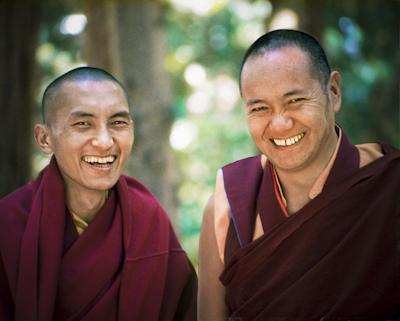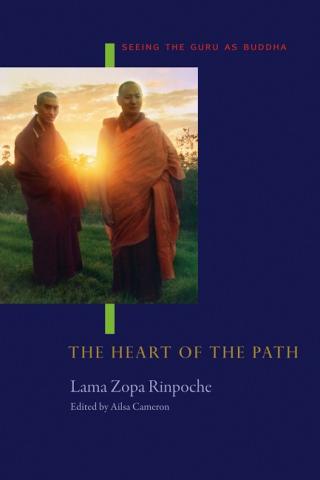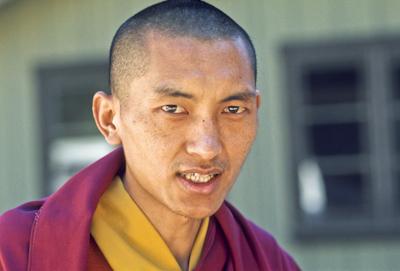E-letter No. 68: January 2009

Dear LYWA Friends,
Thank you for reading our monthly e-letter. Please share it or its contents with others as you see fit.
We thank you for your kind support over the years since we were founded by Lama Zopa Rinpoche in 1996 and wish you, your family and friends all the very best for an enlightening 2009.
Update on our Current Projects

Here we’re psyched that Lama Zopa Rinpoche’s amazing teachings on guru devotion, The Heart of the Path, will be going to the printer soon. More on its availability next month. We also have a little DVD we’re about to produce, Lama Yeshe at Disneyland and Yucca Valley, 1977. These have been transferred from a couple of short 8 mm. films made by the wonderful Carol Royce-Wilder.
Other projects in various stages of development for publication this year include Lama Zopa Rinpoche’s Teachings from the Medicine Buddha Retreat, Lama Yeshe’s and Lama Zopa Rinpoche’s Freedom Through Understanding (book and DVD), Lama Yeshe’s and Lama Zopa Rinpoche’s Life, Death and After Death (book and DVD) and the major production, the official biography of Lama Yeshe, Big Love, which is not only the story of Lama but also the history of the early years of the FPMT.
What's New on the Web
You can listen online to Lama Zopa Rinpoche's 8-day series of lamrim teachings given in Guadalajara Mexico in April 2008. The unedited transcript is included. You can also listen to the public talk that preceded this series.
We have also just posted the audio recordings of Rinpoche's teachings from June 2006 at Tara Institute in Australia titled "Why We Need a Spiritual Path." You can listen online here, where you can also follow along with the unedited transcript.
Read the transcript of an interview between Rinpoche and a student where Rinpoche offers advice on guru devotion, purification, practices for success and more. You can also read many other advices in Rinpoche's Online Advice Book, where you'll find over 500 advices from Rinpoche on a variety of topics.
And, finally, we have posted the html version of some of our most popular titles, which previously were only available online as pdfs: Rinpoche's The Joy of Compassion and Making Life Meaningful, and His Holiness the Dalai Lama's Illuminating the Path to Enlightenment. Now you can read and search these as you can with all the other teachings on our site.

Our other big project, Publishing the FPMT Lineage, is in full swing, although we need many more donations to match our $500,000 grant. Editors are busily working on Lama Zopa Rinpoche’s teachings on impermanence and death, the three lower realms, refuge and the eight worldly dharmas. Work will soon begin on the perfect human rebirth as well.
So thank you again for your kind support that makes all this possible and please continue to support us during these challenging times.
Much love,

Nick Ribush
Director
The Source of Happiness

No matter how much wealth we have, we can’t find satisfaction. No matter how many friends we have, we can’t find satisfaction. No matter how much political power or fame we have, we can’t find satisfaction. What is missing? Why can’t we find satisfaction in our life?
We are looking for happiness every moment of the day and night, even in our dreams, but we can’t find satisfaction. It shows that something is wrong with our method of seeking happiness. It is very, very important to meditate on this to find out what is missing.
After you have everything, you experience even more depression and nervous breakdowns. You try everything—friends, wealth, fame, power—as a way to find happiness, but you still feel empty inside, as if something was missing. Since nothing you try can fill this inner hole, you then experience more depression. You feel there is no hope. Why? Because even after you have tried everything external that you could, you still couldn’t find satisfaction. You then feel even more depressed and hopeless. Everything becomes dark, like having a fog in your mind.
It’s important to examine why we can’t find satisfaction. As long as we look for happiness to come from outside, we won’t find satisfaction. Only when we look for happiness to come from inside, from within our own mind, will we find peace, happiness, and satisfaction. As long as we don’t know the evolution of peace and happiness, that they come from our own mind and not from outside, as long as we don’t attempt to seek happiness from our own mind, there is no way we can find peace or satisfaction. We will always have problems. As long as we believe that happiness has to come from outside, from other people or from the external environment, we will always blame something outside whenever we have a problem. We will think that the problem comes from other people or from the environment. Many children, for example, think that their problems come from their parents. They say, “I’m like this because of my mother and father. My parents are to blame.” The culture also teaches children to blame their parents for their problems, rather than emphasizing how kind parents are.
This happens because education about the mind has not been developed in Western culture. While there has been external scientific development, there has been limited development in regard to knowledge of the mind. No effort has been put into research into inner knowledge, into where happiness and suffering come from.
There’s disharmony between children and parents, rather than harmony, peace, and friendship. Children are born after spending many months in the womb and being taken care of by their parents. Parents then continue to take so much care of their children, cherishing them as more precious than their own lives. They suffer so much to protect their children and ensure that they are happy, healthy, and educated. They go through so much pain, physically and mentally. They experience so much worry and fear, as well as material expenses. Parents protect their children from hundreds of dangers to their lives even in one day. They also teach them how to walk and how to talk and give them an education. Their kindness is infinite. Generally, there’s so much more kindness than harm from other sentient beings.
It’s very sad that after all the suffering and hardship parents undergo to take care of their children, the children then blame their parents for their problems rather than emphasizing their kindness. The members of a family then oppose each other. We might think about how we can contribute to world peace, but if we can’t help bring peace in our own family, how can we bring peace to the world?
When we have problems we always put the blame outside, but as long as we point to something outside as the source of our happiness and suffering, we will always have problems in our life.
One fundamental explanation of how our happiness and problems come from our own mind is that things come into existence through our mind giving labels. For example, when there’s a difficult situation in our life, we can look at it as positive by thinking of its benefits. By thinking of the benefits of friends, money, fame, and power, we are willing to sacrifice ourselves to get them, no matter how hard or dangerous it is. If we look at problems in a positive way by thinking of their benefits, we then don’t label them problems. As we don’t label that situation a problem, no problem appears to us. There is no problem. If we look at that situation and label it a problem, it then appears to us as a problem. So, the problem came from our mind.
It completely depends on our own mind, on how we look at the situation. Both ways of thinking came from our mind, but with one way of thinking we experience peace and happiness. The solution is to use our mind to stop problems and to obtain happiness.
Lama Zopa Rinpoche gave this teaching in London, August 1990. Edited from the Lama Yeshe Wisdom Archive by Ven Ailsa Cameron.
